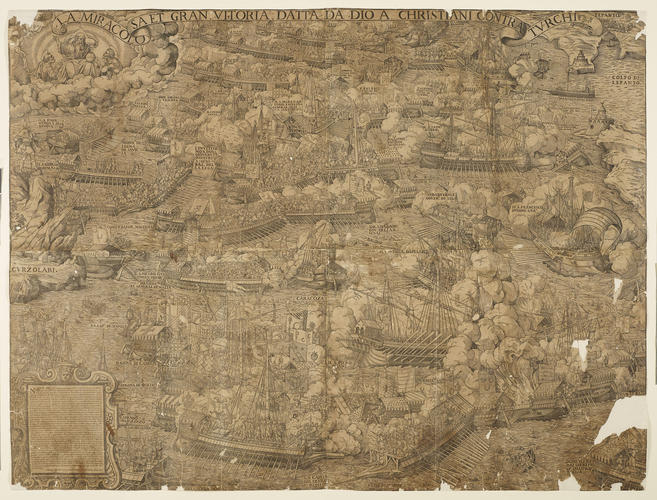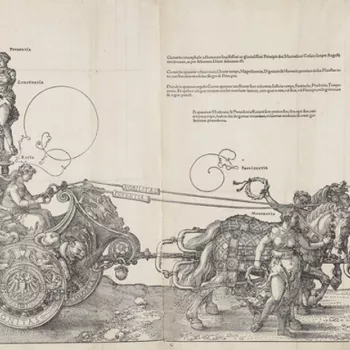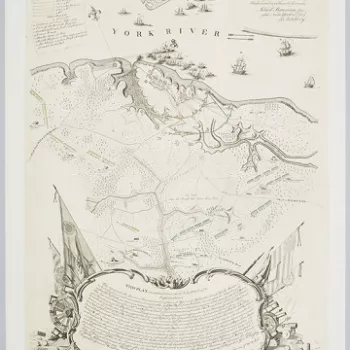Battle of Lepanto, 1572 (Nafpaktos, West Greece, Greece) 38°23ʹ30ʺN 21°49ʹ39ʺE published 1572
Woodcut; printed from four wood blocks on four sheets of paper, joined; letterpress text panel, bottom left; laid down on paper | 38.5 x 51.6 cm (image of each impression) (image) | RCIN 721058
-
A high oblique view/map of the naval Battle of Lepanto, fought on 7 October 1571 between the fleets of the Holy League (Spain, Venice, Genoa, Papal States, Duchies of Tuscany, Savoy Urbino, and the Knights Hospitallers of Malta) commanded by Don John of Austria (24 February 1547-1 October 1578) and the Ottomans, commanded by Grand Admiral Müezzinzade Ali Pasha (d.7 October 1571), resulting in a victory for the Holy League. Fourth Ottoman-Venetian War (1570-1573). Oriented with north to top.
The naval battle of Lepanto, fought off the west coast of Greece on 7 October 1571, was a crushing victory for the 'Holy League' (an alliance of Catholic maritime states) over the Ottoman Empire, which saw most of its fleet sunk or captured. The battle halted Ottoman expansion in the western Mediterranean, though its long-term significance is debatable. This is the only known impression of this large, densely detailed woodcut, published in Venice the year after the battle; the print was already in poor condition when Cassiano dal Pozzo acquired it and laid it onto a backing sheet.
This is a fine woodcut: the clash of battle, with its associated noise, and the smoke of gunfire, is conveyed by an assured and accomplished hand. The structures of the ships, with their crews, armies and flags with coats of arms are shown in considerable detail. The names of the commanders appear beside their respective vessels including, at the top of the view, immediately below the ‘D’ of ‘DATTA’, Agostino Barbarigo (1518-9 October 1571) the Venetian commander of the Christian left wing, killed in the battle by an arrow through his left eye; to Barbarigo’s left is Admiral Antonio Canal (2 April 1521-1577). He is shown engaging with a Turkish galley, perhaps that of Mehmet Shoraq whose galley he sank. Towards the top, left of centre, next to the banner of the Papal States, is the name of Admiral Marcantonio Colonna (1535- 1 August 1584), one of the commanders of the Christian centre. Also commanding the centre, below him, to the left, is the galley of the twenty-four-year-old overall commander of the Christian fleets (distinguished as such by the use larger letters), Don John of Austria (24 February 1547-1 October 1578). The galley to the right of John of Austria flies the standard of the Republic of Venice with its emblem, the winged lion; the name of the Venetian commander, Sebastiano Venier (later Doge of Venice; c.1496-3 March 1578) is written along the side of the ship. The commander of the Christian right, the Genoese Admiral Giovanni Andrea Doria (1539-1606), can be seen, bottom left, while the galley of the commander of the reserve fleet, the Spanish Admiral Álvaro de Bazán, (12 December 1526-9 February 1588) can be seen emerging from behind a rocky coastline, centre of left edge.An oil painting with the same title and showing very similar detail is in the Museo Correr of Venice (Number Cl.I n. 2062). The artist is not named but it is attributed to an anonymous painter from the Venetian area. The date of the painting is given as 1571-1600. It is not known whether the woodcut is taken from the painting or vice versa. See file 3450: http://www.archiviodellacomunicazione.it/Sicap/opac.aspx?WEB=MuseiVE&LNG=ENG
Additional text: [bottom left, in a cartouche, letterpress:] NOBILIS Illa hæc est naualis pugna, que ad Echinades in Ionio euenit in sinu / Corinthiaco nonis Octobris, anni 1571 ... [there follows a long description of the battle.]
For further reading, see:
Franco Fasulo, ‘Canal, Antonio’ Dizionario Biografico degli Italiani, vol. 17, 1974.
Condition: six fold lines; before the four prints were laid down on paper (the date when this was done is not known, but the backing paper is similar in age to the Cassiano period), each impression had suffered considerable wear and tear, especially the bottom right sheet; small pieces are missing from all four sheets; the whole is cropped to the edge of the image.Provenance
From the collection of Cassiano dal Pozzo (1588-22 October 1657); inherited by his brother, Carlo Antonio dal Pozzo (1606-1689); sold by Carlo Antonio’s grandson to Clement XI, 1703; acquired by Cardinal Alessandro Albani by 1714, from whom purchased by George III in 1762
-
Creator(s)
(print seller)Acquirer(s)
-
Medium and techniques
Woodcut; printed from four wood blocks on four sheets of paper, joined; letterpress text panel, bottom left; laid down on paper
Measurements
38.5 x 51.6 cm (image of each impression) (image)
77.3 x 103.2 cm (sheet) (whole object)
Markings
watermark: A mermaid in a shield, a six-pointed star above [see Woodward nos 93-94]. On backing paper, indistinct: a shield with part of a cross or a '4'?
annotation: Old heading: Naval Engagement Lepanto 1571. Other annotations: (Recto) none. (Verso) [top right, red pencil:] 1/54; [top right, black pencil, erased:] I [or II]/58.
Alternative title(s)
LA, MIRACOLOSA ET GRAN, VITTORIA, DATTA DA DIO A, CHRISTIANI CONTRA TVRCHI
Lepanto La Miracolosa et Gran Vitoria datta da Dio a Christiani contro Turchi: apresso Dom. de Franciscus, 1572. 4 foglie.










